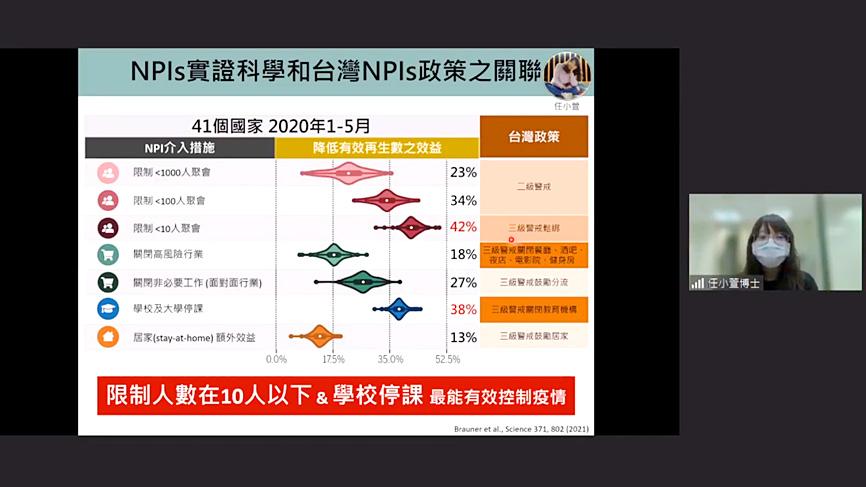Aside from boosting the nation’s COVID-19 vaccination coverage, implementation of nonpharmaceutical interventions (NPIs) is key to controlling the COVID-19 pandemic, as the Delta variant of SARS-CoV-2 spreads around the world, infecting even fully vaccinated people, public health experts said yesterday.
In his weekly online broadcast on the latest COVID-19 situation, National Taiwan University College of Public Health professor Tony Chen (陳秀熙) analyzed the correlation between number of cases, mortality rates, level of NPIs, vaccination coverage and the GDP of several countries.
The Delta and Alpha variants of SARS-CoV-2 have been the two main strains since May, but the former is rapidly outpacing the latter to become the dominant strain, causing a surge in cases in many countries and more vaccine breakthrough infections, he said.

Screen grab by Wu Po-hsuan, Taipei Times
Breakthrough cases refer to people testing positive for COVID-19, despite being fully vaccinated for at least 14 days.
A US study last month showed that 346 people, or 74 percent, of the 469 cases of COVID-19 associated with multiple summer events and large public gatherings in a town in Massachusetts were fully vaccinated, and genomic sequencing of specimens from 133 patients identified that 90 percent were infected with the Delta variant, he said.
Another study conducted in Israel when the Alpha variant was dominant showed that 39 vaccine breakthrough infections, or 2.6 percent, were found among 1,497 fully vaccinated healthcare professionals, but most of them were asymptomatic or had mild symptoms, he said.
The data suggest that even in places where the vaccination coverage is relatively high, the Delta variant can still cause a small surge in cases, Chen said.
NPIs, such as wearing a mask and maintaining social distancing, are still important to avoid catching the virus, even for people who have completed the vaccine regimen, he added.
An analysis of NPI measures adopted by other countries shows that the most effective measures to lower the reproduction number of COVID-19 are limiting the number of people in gatherings to fewer than 10 and suspending school, Chen’s research team said.
Taiwan should conduct a rolling review of COVID-19 prevention and response guidelines for high-risk public venues, such as gyms, restaurants and wedding banquets, which have been conditionally reopened, the team said.
In Taiwan, Alpha is still the dominant strain, infection and death numbers are relatively low, the NPI level is relatively high and vaccine coverage is growing, so the risk of a local COVID-19 outbreak is expected to remain low, Chen said.
While Taiwan has lowered the nationwide COVID-19 alert to level 2, it should continue to implement NPIs as a key measure to contain the virus, especially in the face of the Delta variant spreading around the world, he added.

A decision to describe a Chinese Ministry of Foreign Affairs statement on Singapore’s Taiwan policy as “erroneous” was made because the city-state has its own “one China policy” and has not followed Beijing’s “one China principle,” Deputy Minister of Foreign Affairs Tien Chung-kwang (田中光) said yesterday. It has been a longstanding practice for the People’s Republic of China (PRC) to speak on other countries’ behalf concerning Taiwan, Tien said. The latest example was a statement issued by the PRC after a meeting between Singaporean Prime Minister Lawrence Wong (黃循財) and Chinese President Xi Jinping (習近平) on the sidelines of the APEC summit

Taiwan’s passport ranked 34th in the world, with access to 141 visa-free destinations, according to the latest update to the Henley Passport Index released today. The index put together by Henley & Partners ranks 199 passports globally based on the number of destinations holders can access without a visa out of 227, and is updated monthly. The 141 visa-free destinations for Taiwanese passport holders are a slight decrease from last year, when holders had access to 145 destinations. Botswana and Columbia are among the countries that have recently ended visa-free status for Taiwanese after “bowing to pressure from the Chinese government,” the Ministry

‘SIGN OF DANGER’: Beijing has never directly named Taiwanese leaders before, so China is saying that its actions are aimed at the DPP, a foundation official said National Security Bureau (NSB) Director-General Tsai Ming-yen (蔡明彥) yesterday accused Beijing of spreading propaganda, saying that Chinese President Xi Jinping (習近平) had singled out President William Lai (賴清德) in his meeting with US President Joe Biden when talking about those whose “true nature” seek Taiwanese independence. The Biden-Xi meeting took place on the sidelines of the APEC summit in Peru on Saturday. “If the US cares about maintaining peace across the Taiwan Strait, it is crucial that it sees clearly the true nature of Lai and the ruling Democratic Progressive Party (DPP) in seeking Taiwanese independence, handles the Taiwan question with extra

HEALTHCARE: Following a 2022 Constitutional Court ruling, Taiwanese traveling overseas for six months would no longer be able to suspend their insurance Measures allowing people to suspend National Health Insurance (NHI) services if they plan to leave the country for six months would be abolished starting Dec. 23, NHIA Director-General Shih Chung-liang (石崇良) said yesterday. The decision followed the Constitutional Court’s ruling in 2022 that the regulation was unconstitutional and that it would invalidate the regulation automatically unless the NHIA amended it to conform with the Constitution. The agency would amend the regulations to remove the articles and sections that allow the suspension of NHI services, and also introduce provisional clauses for those who suspended their NHI services before Dec. 23, Shih said. According to